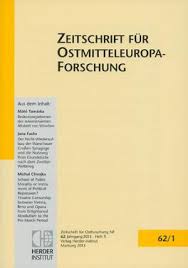Rekonstruktionen eines Erinnerungsraums: Bukowina und „Bukowinismus“ in den Lebensgeschichten deutscher und polnischer Umsiedler
Reconstructions of a lieu de mémoire: Bukovina and “Bukovinism” in the Narratives of German and Polish Resettlers
Author(s): Maren Röger, Oskar CzendzeSubject(s): Oral history, Political history, WW II and following years (1940 - 1949), Post-War period (1950 - 1989), Cold-War History, Ethnic Minorities Studies
Published by: Verlag Herder-Institut
Keywords: oral history; Bukovina; memory; forced migration; German-Polish relations; Second World War; Cold War; 1989; cultural pluralism; European integration;
Summary/Abstract: The historic region of Bukovina, until 1918 a heavily multi-ethnic crownland of the Habsburg monarchy that was divided in 1940, is constantly being recreated in the stories and memories of its former inhabitants. Despite the dynamics of violence during the “short twentieth century,” the region serves as a central and primarily positive place of identification for many groups. In this article, we explore the question of how, and under which circumstances, this site of memory was designed, focusing on the stories of German and Polish resettlers. Specifically, we compare and analyze German and Polish interviews as well as written memoirs that were created between the 1950s and 2017. These stories reveal a distinct narrative pattern, what can be called “Bukovinian tolerance.” While in the early years of the Cold War this narrative still contained certain elements of Habsburg-era “Bukovinism”— a sort of regional patriotism—the construct of tolerance and multi-ethnicity was reshaped within the context of the changing political situation in Europe in the post-1989 era and the E.U.’s integration of parts of the former Eastern bloc.
Journal: Zeitschrift für Ostmitteleuropa-Forschung
- Issue Year: 68/2019
- Issue No: 1
- Page Range: 57-81
- Page Count: 26
- Language: German

